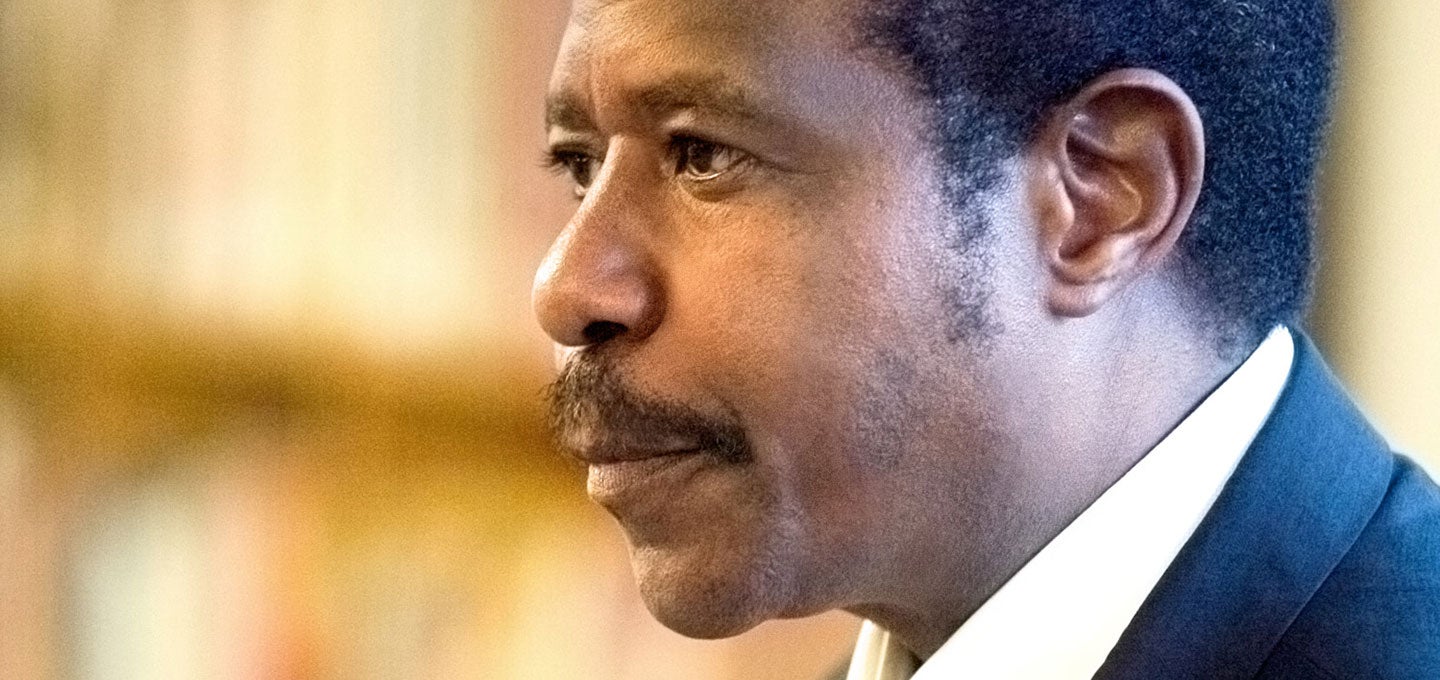In 1994 the country of Rwanda descended into madness. In the spring of that year tensions were high due to years of political and economic strife. When President Juvenal Habyarimana died after his plane was shot down on April 6, this ignited longstanding conflict between two ethnic groups, the Hutu and Tutsi. Encouraged by the presidential guard and radio propaganda, an unofficial militia group called the Interahamwe was mobilized. These extremist Hutus began to slaughter the Tutsi population as well as some moderate Hutus. Over the course of 100 days, almost one million people were killed.
In the face of this genocide, one man made a promise to protect the family he loved and in the course of doing his job found the courage to save over 1,200 people. Paul Rusesabagina used his influence and connections as temporary manager of the Hotel des Mille Collines to shelter over 1,200 Tutsis and moderate Hutus from being murdered by the Interahamwe militia. Who is this extraordinary man? “I don’t consider myself a hero. I consider myself as a normal person who did what he had to do, who has done his job.”
His personal history is typical of a man who was serious about his studies and about pursuing a career. Rusesabagina was born June 15, 1954, at Murama-Gitarama in the Central-South of Rwanda; his parents were farmers. He attended primary and secondary school at the Seventh Day Adventist College of Gitwe, then the Faculty of Theology in Cameroon. In 1979, Rusesabagina found work at Sabena’s newly opened hotel in the Akagera National Park. This experience prompted him to enroll in the hotel management program at Utalii College in Nairobi, Kenya, which included time in Switzerland. Rusesabagina joined Sabena Hotels again and was employed at the Hotel des Mille Collines until November 1993, at which time he was promoted to general manager of the Hotel des Diplomates, also in Kigali.
When the violence began April 6, Rusesabagina brought his family back to the Hotel des Mille Collines for safety. Though Rusesabagina is a Hutu, and so was safe from the Interahamwe, his wife Tatiana is a Tutsi. He could not escape the war zone with his family without outside help. Theirs was not the only family seeking refuge in the hotel. Beginning on April 7, hundreds of people — most of them Tutsi or Hutu threatened by Interahamwe supporters — took shelter at this luxury hotel in central Kigali owned by Sabena Airlines. Although set apart from city streets by its spacious, well-groomed grounds, the hotel offered no defense against attack beyond its international connections.
Rusesabagina recognized the value of those connections. On April 15, acting as temporary manager of the hotel, he called for its protection in an interview with a Belgian newspaper. So, too, did an official of Sabena, who spoke on Belgian television. Rwandan authorities responded by posting some National Police at the hotel. In later contacts with the press and others, by telephone calls and fax messages, occupants of the hotel made the Mille Collines a symbol of the fear and anguish suffered by the Tutsi and others during these weeks.
On April 23, a young lieutenant of the Department of Military Intelligence arrived at the hotel at around 6 a.m. and ordered Rusesabagina to turn out everyone who had sought shelter there. Told that he had half an hour to comply with the order, Rusesabagina went up to the roof and saw that the building was surrounded by military and the Interahamwe. He and several of the occupants began telephoning influential people abroad, appealing urgently for help. Rusesabagina explained, ”I only went on doing my job. Doing my work, my responsibility, my day to day duty.” One of the foreign authorities called from the hotel was the Director General of the French Foreign Ministry. Before the half hour had elapsed, a colonel from the National Police arrived to end the siege.
In a similar incident on May 13, a captain came to the hotel in the morning to warn that there would be an attack at 4 p.m. On that day, the French Foreign Ministry received a fax from the hotel saying that Rwandan government forces plan to massacre all the occupants of the hotel in the next few hours. That French ministry directed its representative at the U.N. to inform the Secretariat of the threat and presumably also brought pressure to bear directly on authorities in Kigali, as others may have done also. The attack never took place.
In fact, because of the bravery and leadership of Rusesabagina, none of the people who took shelter at the hotel was killed during the genocide. “I didn’t think about leaving, because all of the people who were in the Mille Collines, they only had hope in me. And leaving them down, it would have been a disaster. And as I told you, sometimes we have to face history.”
That history is a shameful one for Rwanda and every other country that knew of the evil massacres. No foreign aid came from the United Nations or its more powerful Western member states until over 900,000 Rwandans had been murdered.
Rusesabagina’s experience forced him to conclude: “The two words ‘never’ and ‘again’ are the most abused words in the world. In 1994 when the genocide was taking place in Rwanda, that is when they inaugurated the Holocaust Museum in Washington DC, and the two most repeated words where ‘never’ and ‘again’. And yet an average of 10,000 people were being butchered each and every day in a small tiny country and nobody cared about that. An African human life does not count in the west.”
In September 1996 Rusesabagina and his family moved as refugees to Belgium where he now has his own business. He remains involved in charitable organizations aiding survivors of the Rwandan tragedy and has established a foundation in his name that provides assistance to children who survived the slaughter.

